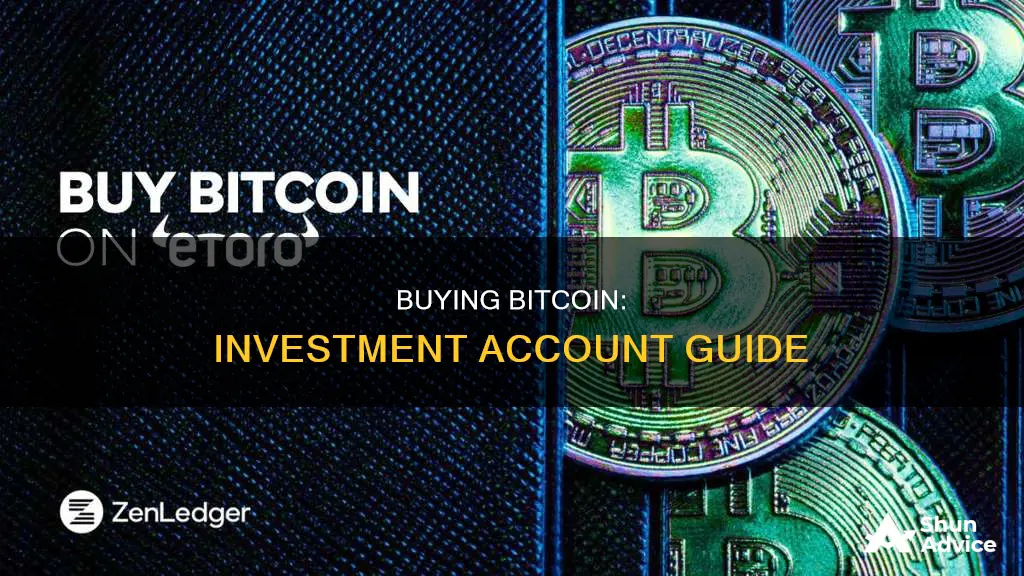
Bitcoin is a cryptocurrency that has seen some wild swings in its price since its introduction in 2009. It has become increasingly popular among investors in recent years, and there are several ways to buy it. Here are the key steps and considerations to keep in mind when purchasing Bitcoin:
Where to Buy Bitcoin
You can buy Bitcoin on cryptocurrency exchanges, traditional brokers, peer-to-peer money transfer apps, or Bitcoin ATMs. Popular exchanges include Coinbase, Binance, Kraken, and Crypto.com. Traditional brokers like Robinhood, Webull, and Fidelity also offer Bitcoin trading. For peer-to-peer apps, options include PayPal, Venmo, and Cash App.
What You Need to Buy Bitcoin
To buy Bitcoin, you typically need a crypto exchange or brokerage account, personal identification documents, a secure internet connection, and a payment method such as a bank account, debit card, or credit card. Some platforms may require additional information, such as your Social Security number and employment details.
Placing Your Order
When placing a Bitcoin order, you can specify the amount you want to invest. Bitcoin can be bought in fractions, so your initial investment could be relatively low. However, it's important to carefully consider your risk tolerance and investment strategy before purchasing.
Storing Your Bitcoin
After purchasing Bitcoin, you'll need to store it in a digital wallet. There are two main types of wallets: hot wallets and cold wallets. Hot wallets are online or software-based and allow for easier transactions but are less secure. Cold wallets are offline hardware devices that provide greater security but may be more cumbersome for frequent trading.
Risks and Considerations
Bitcoin is a volatile and risky investment. Its value can fluctuate significantly over short periods, and there is no central regulator or intrinsic value backing the currency. Additionally, there are security concerns and the potential for scams or fraudulent schemes. It's important to understand these risks and do thorough research before investing in Bitcoin.
| Characteristics | Values |
|---|---|
| Number of Ways to Buy Bitcoin | 6 |
| Examples of Ways to Buy Bitcoin | Bitcoin Wallets, Cryptocurrency Exchanges, Traditional Brokers, Money Transfer Apps, Bitcoin ATMs, Bitcoin ETFs |
| Cryptocurrency Exchanges Where You Can Purchase Bitcoin | Gemini, Kraken, Coinbase, Crypto.com |
| Traditional Brokers That Allow Customers to Buy and Sell Bitcoin | Robinhood, Webull, TradeStation, Fidelity |
| Money Transfer Apps That Allow You to Purchase Bitcoin | PayPal, Venmo, Cash App |
| Bitcoin ETFs | Spot Bitcoin ETFs |
| Types of Wallets | Hot Wallet, Cold Wallet |
| Hot Wallet Providers | Electrum, Mycelium |
| Cold Wallet Providers | Trezor, Ledger |
| Documents Required to Purchase Bitcoin | Personal Identification, Bank Account Information |
What You'll Learn

Choosing a crypto-trading service or venue
When choosing a crypto-trading service or venue, there are several factors to consider. Here are some essential tips to help you select the right platform for your needs:
Security and Regulation:
The security of your funds should be a top priority. Look for platforms that implement robust security measures such as two-factor authentication (2FA), cold storage wallets, and encryption protocols. Ensure that the platform is compliant with relevant regulatory standards to protect yourself from potential scams or legal complications.
Reputation and Track Record:
Research the reputation and history of the platform. Look for user reviews, community feedback, and the platform's record of security breaches. Opt for platforms with a solid reputation and a proven track record of reliable service.
Supported Crypto-assets:
Different platforms support different cryptocurrencies. Ensure that the platform you choose offers the crypto-assets you want to trade or invest in. Popular platforms usually offer a wide range of crypto-assets, including Bitcoin (BTC), Ethereum (ETH), and other major altcoins.
Liquidity:
Liquidity refers to the ease of buying or selling a crypto-asset without significantly impacting its price. Higher liquidity ensures smoother transactions and minimizes the risk of slippage. Choose a platform with good liquidity to ensure your orders are executed promptly at fair prices.
User Interface and Experience:
An intuitive and user-friendly interface is essential, especially for beginners. Look for platforms with a clean and easy-to-navigate interface suitable for your level of experience. Additionally, check if the platform offers a mobile app for trading on the go.
Fees:
Crypto platforms charge fees for various services, including deposits, withdrawals, and trading activities. Compare the fee structures of different platforms to find one that aligns with your budget and trading preferences. Be cautious of hidden fees or excessively high charges, as they can eat into your profits.
Customer Support:
Prompt and reliable customer support is crucial, especially when you encounter issues or have queries. Choose a platform that provides multiple channels for customer support, such as live chat, email, or phone.
Geographical Restrictions:
Some platforms have geographical restrictions, so ensure that the platform you choose operates in your country or region. Also, consider whether the platform offers localized language support and complies with local regulations.
Trading Tools and Features:
Advanced traders often require access to various trading tools and features, such as charting tools, order types, stop-loss options, and margin trading. Ensure that the platform offers the necessary tools to facilitate your trading strategy.
Transparency and Reporting:
Transparency is vital in the crypto world. Look for platforms that provide regular reports on trading volume and audits. Transparent platforms inspire trust and enable you to make informed investment decisions.
Bitcoin Profit Margins: How to Find Success
You may want to see also

Connecting your exchange to a payment option
At most exchanges, you can connect your bank account directly or link it to a debit or credit card. While it is possible to use a credit card to purchase cryptocurrency, it is generally not recommended due to the potential for high interest charges and transaction fees. Additionally, some banks may question or even stop deposits to crypto-related sites or exchanges.
It is important to note that fees vary for deposits and transactions made via bank account, debit card, or credit card. Therefore, it is essential to review the fees associated with each payment option before proceeding.
Another option for purchasing Bitcoin is through a payment processor like PayPal. PayPal allows you to connect your account to a debit card or bank account or use the balance in your PayPal account to buy cryptocurrencies from a third-party provider. However, it is worth noting that when you buy Bitcoin directly from PayPal, they earn money from the crypto spread, which is the difference between Bitcoin's market price and its exchange rate with the US dollar. Additionally, PayPal charges a transaction fee for each purchase, which depends on the dollar amount purchased.
Overall, when connecting your exchange to a payment option, it is crucial to consider the associated fees, transaction limits, and potential risks, such as volatility and security concerns.
The Ultimate Guide to Cryptocurrency Coin Price Investing
You may want to see also

Placing an order
Once you've chosen an exchange, you can place your first order to buy Bitcoin. Depending on the platform you're using, you may be able to purchase Bitcoin by tapping a button, or you may have to enter Bitcoin's ticker symbol: BTC. Next, input the amount you want to invest. If Bitcoin's current price is around $40,000, you'd need to invest that much to buy 1 BTC. If you invested less, say $1,000 when 1 BTC equals $40,000, you'd get a percentage of a Bitcoin equal to about 0.025 BTC.
Some exchanges allow you to buy fractions of a single coin—your initial investment could be as low as $25. However, it's important to remember that investing in Bitcoin is very risky, and it's crucial to carefully determine your risk tolerance and review your investment strategy before purchasing any Bitcoin.
You can also buy Bitcoin through a brokerage, such as eToro, or a centralized cryptocurrency exchange (CEX) like Coinbase.
The Ultimate Guide to Long-Term Ripple Bitcoin Investing
You may want to see also

Safe storage
Hot Wallets vs. Cold Wallets
There are two main types of wallets for storing Bitcoin: hot wallets and cold wallets. Hot wallets are online wallets that are connected to the internet, such as apps on computers, phones, or tablets. They offer faster transactions but are more vulnerable to hacking and theft. Cold wallets, on the other hand, are offline wallets that are not connected to the internet. They provide an additional layer of security but may require more time for transactions.
Hardware Wallets
Hardware wallets are physical devices specifically designed to store your Bitcoin and other cryptocurrencies securely. Examples include Trezor and Ledger. These wallets keep your private keys offline and allow you to interact with your wallet without exposing your data. They are considered one of the safest options for storing Bitcoin.
Cold Storage Methods
Cold storage refers to keeping your Bitcoins offline, reducing the risk of theft by hackers and malware. Here are some methods for cold storage:
- Offline Storage Devices: You can store your Bitcoin on devices like USB drives, CDs, or floppy disks. However, these devices are susceptible to physical damage, magnetic interference, and data corruption over time.
- Paper Wallets: Paper wallets involve printing your public and private keys on paper. While this method is offline and secure, paper is vulnerable to physical damage, such as tearing, burning, or water damage.
- Metal Engraving: You can engrave your private keys on a piece of metal. Choose a corrosion-resistant metal with a high melting point, such as silver, gold, or copper. However, metal can still deform or melt in extreme heat.
- Air-Gapped Computers: You can set up a secure offline computer by using an old laptop or phone, wiping all data, and installing only an operating system and a Bitcoin wallet. This method ensures that your wallet is never connected to the internet.
Best Practices for Safe Storage
Regardless of the storage method you choose, there are some general best practices to enhance the security of your Bitcoin:
- Strong Passwords and Two-Factor Authentication: Always use strong, unique passwords for your digital wallets and currency exchange accounts. Enable two-factor authentication for added security.
- Backup Your Wallet: Back up your wallet.dat file in multiple locations, such as cloud storage, USB drives, and CDs stored in different geographic locations.
- Watch-Only Wallets: Consider using a watch-only wallet, which allows you to check your balance and receive money without exposing your private keys.
- Avoid Online Services: Avoid storing your Bitcoin on online web wallets or hot wallets connected to the internet. These are more vulnerable to hacking and theft.
- Don't Share Your Private Key: Never share your private key with anyone. Keep it secure and confidential.
My Bitcoin Loss: A Costly Lesson Learned
You may want to see also

Understanding the risks
Bitcoin is a particularly volatile investment, meaning its price may quickly rise or fall. As a result, there is a risk of losing your entire investment if you are not cautious. Here are some of the risks you should be aware of:
- Market volatility: The price of Bitcoin is constantly changing and unpredictable. As a result, there is no guarantee of getting a return on your investment. To avoid massive losses, it is advisable to make small investments and monitor the market closely.
- Cyberattacks and hacking: Cryptocurrency is technology-based, making it vulnerable to cyberattacks and hacking. If your private key is compromised or you lose access to your wallet, there may be no way to retrieve your Bitcoins.
- Fraud: The lack of regulation in the Bitcoin market creates opportunities for fraud. Buyers and sellers may be duped into participating in fraudulent exchanges, leading to significant losses.
- Limited regulation and taxation: The absence of clear regulations and taxation policies for Bitcoin can lead to uncertainty and potential issues with government currency in the future.
- Technology reliance: As a 100% technology-based currency, Bitcoin is entirely dependent on technology. Any issues with the technology or online systems used can negatively impact the value of Bitcoin and your investment.
- Block withholding: A small group of miners can use their computational power to hide newly created blocks from honest miners, allowing them to benefit while others lose out.
- Limited acceptance: Despite its popularity, Bitcoin is not widely accepted or recognised as a legitimate currency by many companies and governments. This lack of acceptance limits its usefulness and could impact its future viability.
- Risk of bubble economy: Some critics argue that Bitcoin is a Ponzi scheme that creates a bubble economy. As more people invest, the bubble may eventually burst, leading to a sharp decline in Bitcoin's value and significant financial losses for investors.
- Private key risks: Your private key is essential for accessing and transferring your Bitcoins. If you lose your private key or it is stolen, you may lose access to your Bitcoins permanently.
- Scams and fraud: Cryptocurrency scams are on the rise, and fraudsters may employ various tactics to gain access to your private key or account details.
To mitigate these risks, it is essential to research and understand the market, invest small amounts, use secure wallets, and diversify your investments. Additionally, always use a secure, private internet connection when making financial transactions involving Bitcoin.
BlackRock's Bitcoin ETF: A Guide to Investing
You may want to see also
Frequently asked questions
There are several ways to buy Bitcoin, including through a cryptocurrency exchange, a traditional broker, a money transfer app, a Bitcoin ATM, or a Bitcoin exchange-traded fund (ETF).
When opening an account to purchase Bitcoin, you will need to provide basic personal information, including your name, Social Security number, address, phone number, and bank account number.
Bitcoin is a very high-risk and volatile investment. On the one hand, it offers the potential for huge returns, perhaps as high as 200% or more. On the other hand, there is a possibility of losing money due to its extreme volatility.
There are two main types of Bitcoin wallets: hot wallets and cold wallets. Hot wallets are operated by a cryptocurrency exchange or provider and allow you to access your coins through the internet or a software program. Cold wallets, on the other hand, are hardware devices that store your coins offline, providing greater security but less accessibility.







